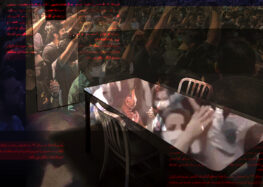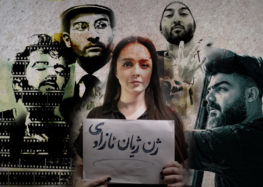Imprisoned Blogger Will Get Medical Leave Only If He Confesses, Say Authorities
 On 8 April, authorities transferred Hossein Ronaghi Maleki, a blogger who has been suffering from kidney and bladder disease while in prison, to Hasheminejad Hospital. His mother, Zoleikha Mousavi, told the International Campaign for Human Rights in Iran that judicial authorities have denied him medical leave.
On 8 April, authorities transferred Hossein Ronaghi Maleki, a blogger who has been suffering from kidney and bladder disease while in prison, to Hasheminejad Hospital. His mother, Zoleikha Mousavi, told the International Campaign for Human Rights in Iran that judicial authorities have denied him medical leave.
“They want Hossein to accept his charges and write a confession letter before they allow him leave. They told us several times that the IRGC does not agree with his release unless he confesses. But what has Hossein done?! Hossein is so upset, but they won’t even let him talk to us. I swear since yesterday when I saw these conditions, I have been speechless. I have only cried since last night,” said Mousavi.
Ronaghi Maleki’s mother added that security forces mistreated her family when they went to visit Hossein at the hospital.
“[Hossein] came to the hospital with three officials. We were not even allowed to get close to Hossein. They said this is the only way they would allow the examination. We stayed back, so they would take him to the doctor. My daughter called me on my cell phone at that time and I answered it, but the officials attacked all at once and demanded to have my cell phone. I said I wouldn’t give it to them.They thought I had been filming Hossein. I asked them why they were afraid I would film him. They were very abusive. I swear they just want to upset and disrespect us!” she said.
On 13 December 2009, authorities sentenced Hossein Ronaghi Maleki to 15 years in prison for “membership in the Iran Proxy internet group,” “propagating against the regime,” “insulting the Supreme Leader,” and “insulting the President.”
Since he began serving his prison sentence, Ronaghi Maleki has had several operations on his kidneys. “Hossein’s doctor says that his kidney will have to be operated on as soon as possible, but they told us that he would not be given furlough after the operation. His father said that in that case it would be better for Hossein not to have the surgery at all, because the prison environment would worsen his condition post-operation,” Zoleikha Mosuavi told the Campaign.
In a 2011 interview with the International Campaign for Human Rights in Iran, his father, Ahmad Ronaghi Maleki said, “Hear my voice, please. I ask the Supreme Leader, the human rights activists in Iran and in the world, Iranian judicial authorities, and the Tehran Prosecutor to please grant Hossein leave … If there is no attention, Hossein will die.”
Mousavi added that she was unable to speak to her son during the Persian New Year. Traditionally, many Iranian prisoners are granted furlough during the New Year holiday in order to spend time with their families. In recent times, however, many political prisoners have been denied this privilege.
“Mr. Intelligence Minister, Mr. Prosecutor, Mr. President: why wouldn’t they allow my son furlough after 2.5 years?! Why won’t they answer me?! I am a mother. I have not seen my son at Nowruz time [Iranian New year, March 21] in three years. On New Year’s Day [March 21, 2012], they didn’t even allow him to call. I stayed home by the phone on New Year’s Day, waiting for Hossein to call, but he didn’t. Seven days later, I was allowed to see him through a glass booth. They would not even allow me to visit with him in person. What has Hossein done for me not to be able to visit with him in person?”






